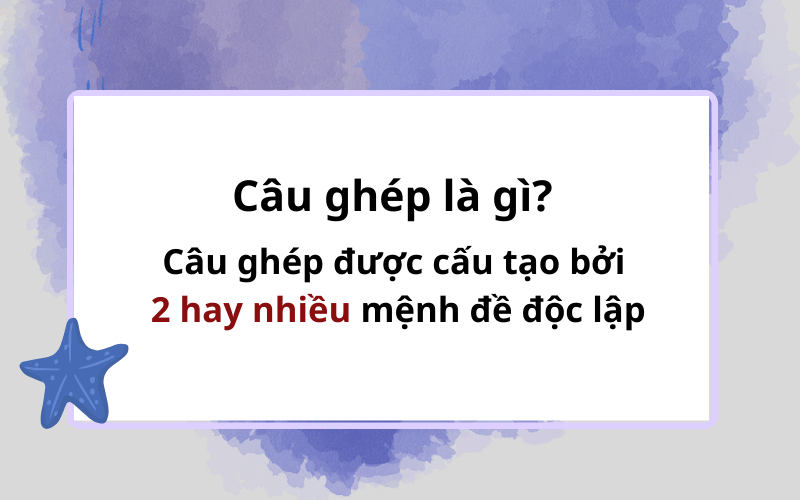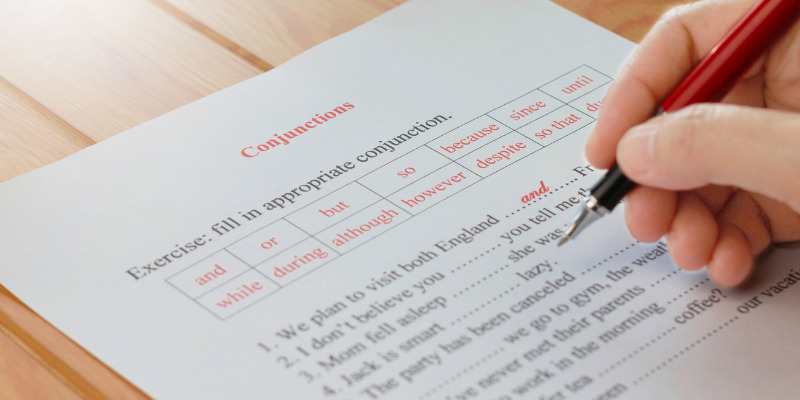Bài tập về câu ghép trong tiếng Anh là phần bài tập rèn luyện ngữ pháp rất quan trọng. Bởi rất dễ gây nhầm lẫn cho người học. Đặc biệt, đây cũng là phần ăn điểm trong IELTS Writing vì thế bạn hãy tham khảo nhé.
Chính vì vậy, trong bài viết này, ieltscaptoc.com.vn sẽ giới thiệu đến bạn toàn bộ kiến thức về câu ghép cũng như bài tập áp dụng. Hãy cùng theo dõi các bạn nhé!
Nội dung chính
1. Câu ghép là gì

- Câu ghép (Compound sentence) được cấu tạo bởi 2 hay nhiều mệnh đề độc lập (Independent clause). Các mệnh đề này thường được nối với nhau bởi liên từ (conjunction), có thể thêm dấu phẩy hoặc dấu chấm phẩy trước liên từ đó, hoặc các trạng từ nối.
- Mỗi 1 mệnh đề có tầm quan trọng và đều có thể đứng một mình.
Tham khảo: Nắm chắc cách làm bài tập liên từ trong tiếng Anh – Đáp án chi tiết
2. Các cách ghép câu trong tiếng Anh
Có 3 cách để có thể kết nối các mệnh đề độc lập thành câu ghép
- Sử dụng 1 liên từ nối
Ví dụ: I enjoy playing tennis, but my sister enjoys playing badminton.
- Sử dụng một trạng từ nối
Ví dụ: I enjoy playing tennis; however, I hate playing badminton.
- Sử dụng dấu chấm phẩy (;)
Ví dụ: I enjoy playing tennis; I hate playing badminton
2.1. Sử dụng các liên từ (conjunction)
Trong tiếng Anh, có 7 liên từ thường dùng để nối trong câu ghép bao gồm: for, and, nor, but, or, yet, so (hay còn gọi tắt là FANBOYS)
Trong đó:
- For: vì
- And: và
- Nor: (không)… lẫn….
- But: nhưng
- Or: hoặc
- Yet: nhưng
- So: vì vậy

Câu ghép sử dụng liên từ được cấu tạo như sau:
| Independent clause 1, + conjunction + independent clause 2 |
- Liên từ for: dùng để chỉ nguyên nhân
Ví dụ:
I never stay in that hotel, for it is really bad.
Tôi không bao giờ ở khách sạn đó vì nó quá tệ.
- Liên từ and: dùng để cộng thêm vào
Ví dụ:
I like playing the guitar and I often go to the guitar club.
Tôi thích chơi ghi-ta và tôi thường đến câu lạc bộ ghi-ta.
- Liên từ nor: dùng để bổ sung một ý phủ định vào ý phủ định đã được nêu trước đó
Ví dụ:
Students don’t do homework, nor do they learn vocabulary.
Học sinh không làm bài tập về nhà cũng không học từ vựng.
- Liên từ but: chỉ sự mâu thuẫn
Ví dụ:
I studied hard, but I didn’t pass the exam.
Tôi học hành rất chăm chỉ nhưng tôi vẫn thi không đậu.
- Liên từ or: dùng để bổ sung một lựa chọn khác
Ví dụ:
You should stop smoking, or your health will be worse.
Bạn nên ngừng hút thuốc hoặc sức khỏe của bạn sẽ trở nên tệ hơn.
- Liên từ yet: dùng để diễn tả ý kiến trái ngược so với ý trước
Ví dụ:
He is rich, yet he isn’t mean.
Anh ta giàu nhưng không keo kiệt.
- Liên từ so: dùng để nói về một kết quả của sự việc được nhắc đến trước đó.
Ví dụ:
He didn’t bring a map, so he got lost.
Anh ta không mang theo bản đồ và anh ta đã bị lạc đường.
2.2. Sử dụng các trạng từ nối (conjunctive adverbs)
- Các mệnh đề độc lập của một câu ghép cũng có thể được kết nối bằng một các trạng từ như: Furthermore, However, Otherwise,…
- Cần lưu ý việc đánh dấu câu khi sử dụng trạng từ nối.
Câu ghép sử dụng trạng từ nối được cấu tạo như sau:
| Independent clause 1; conjunctive adverb, independent clause 2 |
- Những trạng từ mang nghĩa tương tự “and”: Furthermore; besides; in addition to; either; also; moreover; both … and; not only … but also; as well as; …
Ví dụ:
My big brother is good at math; moreover, he is excellent at English.
Anh cả tôi giỏi toán, ngoài ra, anh còn rất giỏi tiếng Anh.
- Những trạng từ mang nghĩa tương tự “but, yet”: However; nevertheless; still; nonetheless; even so; all the same; although; even though; in spite of; despite; whereas; while; on the other hand; …
Ví dụ:
Mary is so fat; however, she keeps eating junk food.
Mary rất mập; tuy nhiên, cô ấy vẫn liên tục ăn đồ ăn nhanh.
- Những trạng từ mang nghĩa tương tự “or”: Otherwise; either … or; neither … nor; …
Ví dụ:
I should be in a hurry; otherwise, you will be late.
Bạn nên nhanh chân lên, nếu không bạn sẽ trễ học.
- Những trạng từ mang nghĩa tương tự “so”: Consequently; therefore; thus; accordingly; according to; hence; as a result of; in consequence of; …
Ví dụ:
He wanted to study late; therefore, he drank another cup of coffee.
Anh ta muốn học khuya; vì thế, anh ta đã thêm một cốc cà phê nữa.
Tham khảo: Tổng hợp các từ nối trong tiếng Anh giúp bạn giao tiếp lưu loát hơn
2.3. Sử dụng dấu chấm phẩy (;)
- Các mệnh đề độc lập trong một câu ghép cũng có thể được kết nối chỉ bằng một dấu (;)
- Kiểu câu này được sử dụng khi hai mệnh đề độc lập có quan hệ gần gũi
- Nếu giữa chúng không có mối quan hệ gần gũi, chúng sẽ được viết tách thành hai câu đơn, tách biệt hẳn bằng dấu chấm.
Câu ghép với dấu (;) được cấu tạo như sau:
| Independent Clause 1; Independent Clause 2 |
Ví dụ:
I’m making a cake; my mother is cooking for dinner.
Tôi đang làm bánh, mẹ đang nấu ăn.
Xem thêm: Cách viết dạng advantage & disadvantage
Bài tập về câu ghép trong tiếng Anh là một phần quan trọng trong ngữ pháp căn bản trong tiếng anh, vì thế bạn cần nắm rõ. Và nếu bạn đang học ngữ pháp tiếng Anh căn bản thì IELTS Cấp Tốc gợi ý bạn trang web học tiếng Anh miễn phí chất lượng là Bhiu.edu.vn.
Xem thêm:
3. Bài tập về câu ghép trong tiếng Anh
Bạn có thể tham khảo bài trên web hoặc download file PDF bài về làm nhé.
Bài tập

Bài tập 1: Complete the sentences with the words given: and, but, or, so, for
- I feel tired, _____I feel weak.
- The Japanese eat healthily, _____they live for a long time.
- I have the flu, _____I don’t feel very tired.
- You should eat less fast food, _____you can put on weight.
- You can go and see the doctor, _____you can go to bed now and rest.
- The Japanese eat a lot of rice, _____they eat lots of fish, too.
- I want to eat ice-cream, _____I have a sore throat
- You should eat less fast food, _____you can put on weight.
- Americans often eat fast food, _____ many of them are overweight.
- You can walk, _____ you can ride a bike to get there.
Bài tập 2: Combine sentences, using appropriate coordinating conjunction in the box
- You may have an allergy. Be careful with what you eat and drink. (so)
- Tom has a temperature. Tom has a sore throat. (and)
- I want to buy other car. I have no money. (but)
- It’s raining. I will stay at home and sleep. (so)
- I pass the test. My parents took me to the cinema. (therefore)
- I feel sleepy. I must finish the report. (however)
- His shoes are worn. He has no socks. (for)
- I wanted to buy a set of Lego. I started to save my money. (so)
- I enjoy visiting many different countries. I wouldn’t want to live overseas. (yet)
- I couldn’t go to your party. I was tired. (for)
- Nana is a vegetarian. She doesn’t eat meat. (so)
- My car is broken. I don’t have enough money to buy a new one. (but)
- Ogami passed her final test with a high score. Her parents took her to Hawaii as a gift. (therefore)
- I prefer cats. They are clean and quiet. (for)
- Tommy hates studying. He goes to school everyday. (yet)
- I feel tired. I need to finish my work. (however)
- The sky is clear. I can see many stars. (and)
- She doesn’t like vegetables. She doesn’t eat fruit. (nor)
- Paul has a three – week holiday. He has enough money to travel. (moreover)
- We are out of food. We should go to the supermarket and buy some things. (so)
Bài tập 3: Nối hai câu riêng lẻ dưới đây thành một câu
- He worked for a woman. She used to be an artist.
- They called a doctor. He lived nearby.
- I wrote an email to my sister. She lives in Italy.
- Linh liked the waiter. He was very friendly.
- We broke a car. It belonged to my uncle.
- Ba dropped a cup. It was new.
- Nam loves books. They have happy endings.
Bài tập 4: Hoàn thành những câu sau với so, but, while, because, or, although
- I haven’t really studied for this exam, ……………….. I feel a little nervous.
- I told him not to come, ……………….. he came anyway.
- ……………….. I was really tired, I took a nap for 15 minutes.
- ……………….. she likes to play basketball, her favorite sport is tennis.
- ……………….. it was really hot outside, I wore shorts.
- I was on time, ……………….. everyone else was late.
- Nadia doesn’t like to drive, ……………….. she takes the bus everywhere.
- Keep quiet ……………….. go out.
- I turned on the fan ……………….. the room was hot.
- Carol showed up for the meeting ……………….. I asked her not to be there.
Bài tập 5: Những câu dưới đây là câu ghép hay câu phức
- I can swim but my brother can’t do it.
- Jane brings an umbrella, for it is going to rain.
- The number of cars which were sold last year was 5,000.
- When he handed in his exercises, he forgot to give his teacher the last page.
- We will go to the cinema after we finish our homework.
- My students play tennis every morning.
- I can walk home or I will take a taxi.
- If I try to learn English now, I will have better opportunities in the future.
- She is good at Math; besides, she can speak 5 languages fluently.
Đáp án
Bài tập 1
| 1. and | 2. so | 3. but | 4. or | 5. or |
| 6. and | 7. but | 8. for | 9. so | 10. or |
Xem thêm: Cách “ăn điểm” dạng bài Opinion Essay
Bài tập 2
- You may have an allergy, so be careful with what you eat and drink.
- Tom has a temperature and a sore throat.
- I want other car but I have no money.
- It’s raining, so I’ll stay home and read.
- I passed the test; therefore, my parents took me to the circus.
- I feel sleepy; however, I must finish the report.
- His shoes are worn, for he has no socks.
- I wanted to buy a set of Lego, so I started to save my money.
- I enjoy visiting many different countries, yet I wouldn’t want to live overseas.
- I couldn’t go to your party, for I was tired.
- Nana is a vegetarian, so she doesn’t eat meat.
- My car is broken, but I don’t have enough money to buy a new one.
- Ogami passed her final test with a high score; therefore, her parents took her to Hawaii as a gift.
- I prefer cats, for they are clean and quiet.
- Tommy hates studying, yet he goes to school everyday.
- I feel tired; however, I need to finish my work.
- The sky is clear, and I can see many stars.
- She doesn’t like vegetables, nor she doesn’t eat fruit.
- Paul has a three – week holiday; moreover, he has enough money to travel.
- We are out of food, so we should go to the supermarket and buy some things.
Bài tập 3
He worked for a woman who used to be an artist.
- They called a doctor who lived nearby.
- I wrote an email to my sister who lives in Italy.
- Linh liked the waiter who was very friendly.
- We broke a car that belonged to my uncle.
- Ba dropped a cup which was new.
- Nam loves books that have happy endings.
Bài tập 4
| 1. so | 2. but | 3. Because | 4. While | 5. Because |
| 6.but | 7. so | 8. or | 9. because | 10. although |
Bài tập 5
- I can swim but my brother can’t do it. (Câu ghép)
- Jane brings an umbrella, for it is going to rain. (Câu ghép)
- The number of cars which were sold last year was 5,000. (Câu phức)
- When he handed in his exercises, he forgot to give his teacher the last page. (Câu phức)
- We will go to the cinema after we finish our homework. (Câu phức)
- My students play tennis every morning. (Câu đơn)
- I can walk home or I will take a taxi. (Câu ghép)
- If I try to learn English now, I will have better opportunities in the future. (Câu phức)
- She is good at Math; besides, she can speak 5 languages fluently. (Câu ghép)
Các bạn có thấy phần kiến thức về câu ghép cũng như bài tập về câu ghép này bổ ích không ạ? Nếu có, hãy tiếp tục theo dõi những bài học tiếp theo với nhiều nội dung còn chất hơn nữa nhé! IELTS Cấp tốc chúc các bạn học tốt!
Xem thêm:


